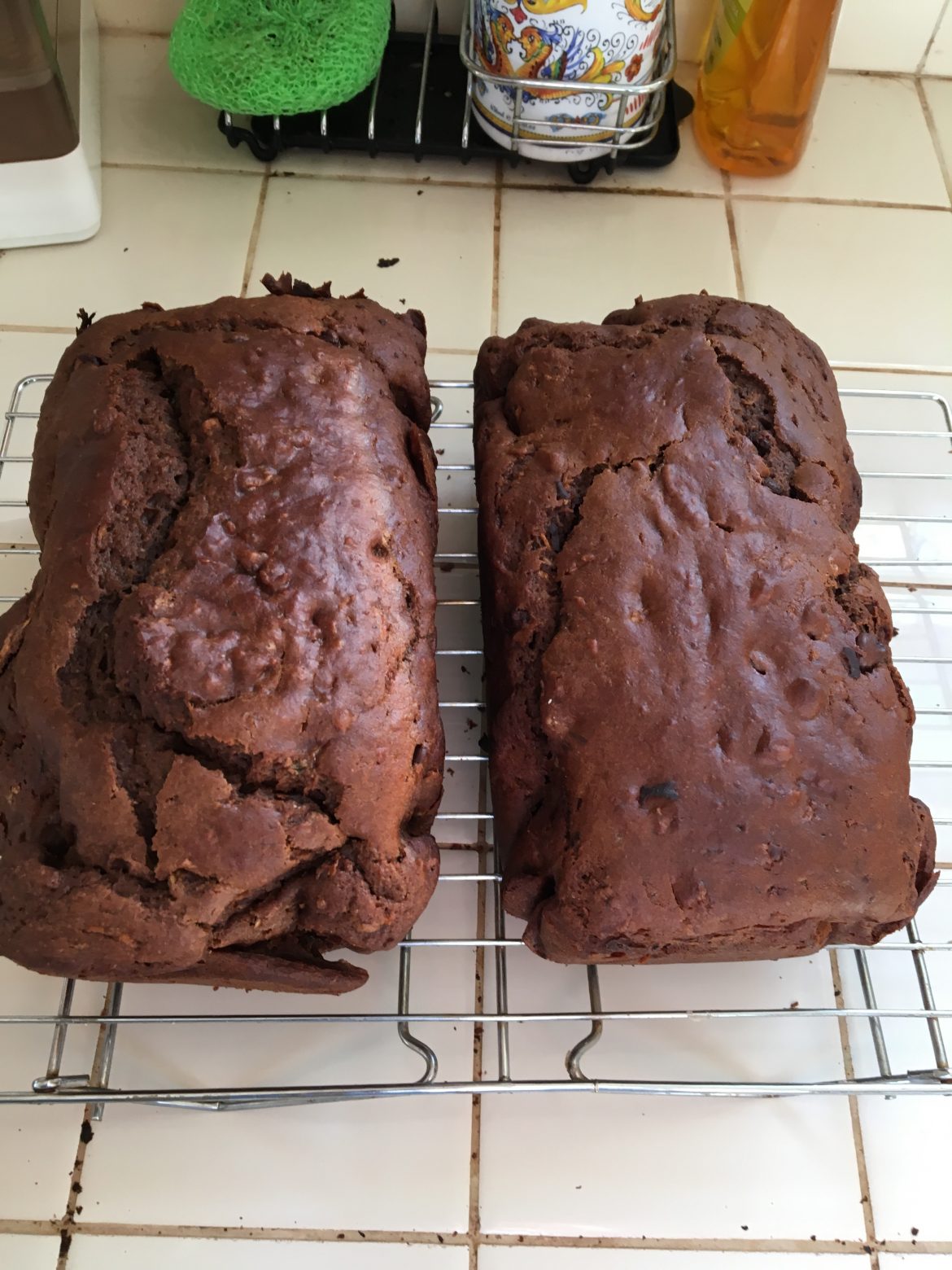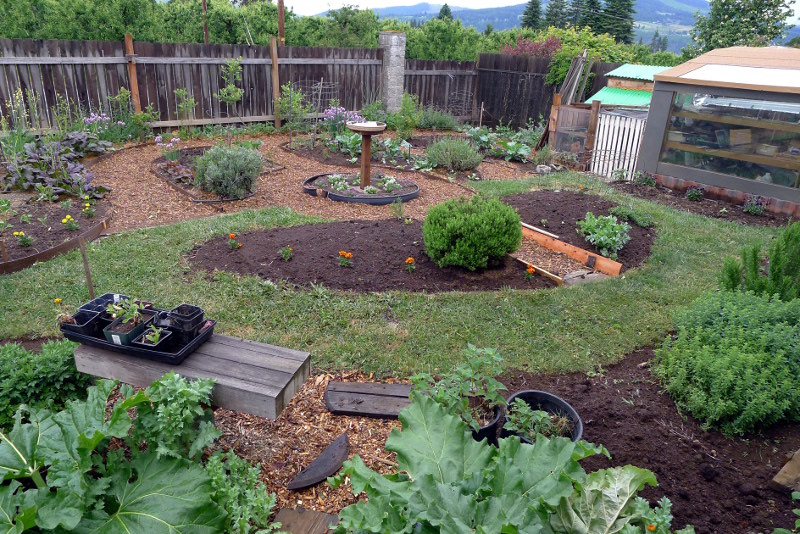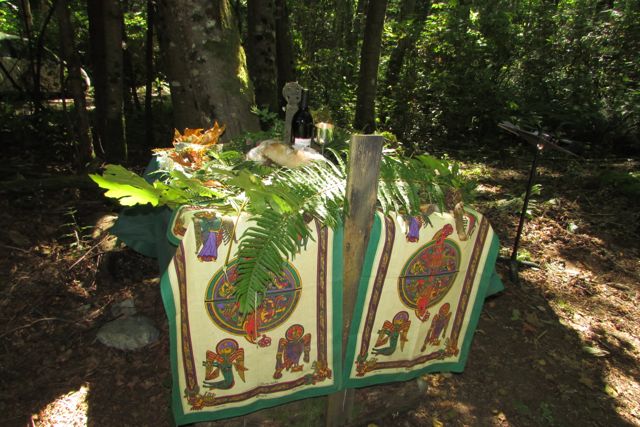This morning I am listening to Hildegard von Bingen, but not feeling very creative so thought I would just post this link to a beautiful rendition of this kyrie which is a great introduction to her music.
However having listened to that you will probably want to spend more time with this recording, so make some time, find a quiet place, relax, refresh, restore.
Last night I posted a photo on instagram and Facebook of chocolate zucchini bread I had just made. There were so many cries for the recipe that I ended up posting my favourite chocolate zucchini bread recipe. As many of you know I have also been processing tomatoes and in this case have been sent recipes that I am looking forward to experimenting with, as well as using my own favourites which I thought I would post today. If you have favourite recipes for summer processing I hope you would consider sharing them – this I realize is another form of hospitality – not just sharing our lives but sharing the things that make life delicious.
===============
Sun Dried Tomato Tapinade
SUMMARY:
We love dried tomatoes – they extend that wonderful summer season and flavour throughout the whole year. I dry them feverishly at this season and pack them in olive oil.
One of my favourite things to make with them is this olive tapinade. Unlike many olive tapinades it has no anchovies in it – which is a huge plus for me and for many of my friends. I adapted it from one I found in the Australian Women’s Weekly Tomato Recipe Book, increased the basil and added loads of garlic.
INGREDIENTS:
– 1 cup Sun Dried Tomatoes
– 1 cup Basil
– 1 cup Pecan
– 3 cloves Garlic
– 1 – 2 tablespoon red wine vinegar
– 1 cup Kalamata Olives
METHOD:
1. Place all ingredients in a food processor and process until smooth. Serve with crackers or pita bread. Wonderful with cheese, great for picnics
===============
Roasted Tomato Sauce
SUMMARY:
This marinara recipe is a standby for us for entertaining throughout the year. It is great in pasta dishes, soups and casseroles. I try to make about 20 quarts while our tomatoes are abundant. It is a wonderful way to preserve the fresh garden flavours. Cooking it in the oven is convenient and means that I can do the tomatoes in small batches. If I only have 5 lb to work with I can still make 2 quarts.
INGREDIENTS:
– 10 lbs. Tomatoes,Cut In Half
– 1 lg Onion,Diced
– 1/2 cup Fresh Basil,Chopped
– 6 each Garlic,Minced
– 1 cup Red Wine
– 1 cup Water
– 1 teaspoon Olive Oil
METHOD:
1. spread out tomatoes in large baking dish, sprinkle onion, & garlic over top. Place in 350 Farenheit oven for 2 hours, stirring occasionally. Add water if liquid dries out. Add red wine and cook a further 1/2 hour. Add basil and remove from oven. Makes 4 quarts. Process in water bath.,
===============
When I posted this afternoon that I had just made chocolate zucchini bread I was deluged with requests for the recipe so here it is. I have adapted this over the years – substituted Greek yoghurt for buttermilk, whole wheat for plain flour and I use just plain stewed apples instead of apple sauce. Give it a try. I highly recommend it. I usually make mini muffins rather than 2 loaves of bread.
It is wonderful with cream cheese frosting.
===============
Chocolate Zucchini Bread or Muffins
INGREDIENTS:
– 3 Eggs
– 1 1/2 cups Brown Sugar,Firmly Packed
– 3/4 cup Oil (safflower or canola)
– 2 ounces Unsweetened Chocolate,Melted, or 4 tablespoons cocoa
– 2 teaspoon Vanilla
– 2 cups Zucchini,Grated
– 1 teaspoon Cinnamon
– 2 teaspoon Baking Soda
– 2 teaspoons Baking Powder
– 1/2 cup Pecans,Sliced, optional
– 3/4 cups Chocolate Chips
– 2 cups Wheat Flour
– 2 cup All Purpose Flour
– 1/2 cup Greek Yogurt
– 1 cup Apple Sauce
– 1/2 cup milk
METHOD:
1. Beat eggs in a food processor until lemon colored, add sugar and oil, apple sauce, yoghurt and vanilla . Stir in melted chocolate or cocoa, add vanilla and stir in zucchini. Sift dry ingredients and stir into zucchini mixture. Stir in nuts and chocolate chips. Grease two 9 x 5 x 3 inch loaf pans. Divide dough between pans. Bake at 350℉ for 50 minutes or until done. Cool in pans for 15 minutes. Turn out on cake rack to finish cooling.
2. Alternatively place spoonfuls of mixture in greased muffin pans. I usually use mini muffin pans. This recipe makes 24 mini muffins plus one loaf or 24 full size muffins, or 2 loafs (I make these when I don’t have time to do the muffins.) It stores well in the freezer.
3. If you do not have baking chocolate use 4 tablespoons unsweetened cocoa
I know that many of you are not on the MSA mailing list so thought that you would appreciate an update of all that is going on. It is an exciting and rewarding season. Thank you for helping make it so.
MSA Imaginings September 2014 – Entering a New Season
 The seasons are changing. In Australia the wattle is in full bloom heralding the beginning of spring. Here in the Pacific NW we are busily harvesting tomatoes, apples, pears and squash. The dehydrator is working overtime and the jars of marinara and applesauce are lining up on the shelves. And across the northern hemisphere students of all ages are heading back to school. We are entering a new season here at MSA, too.
The seasons are changing. In Australia the wattle is in full bloom heralding the beginning of spring. Here in the Pacific NW we are busily harvesting tomatoes, apples, pears and squash. The dehydrator is working overtime and the jars of marinara and applesauce are lining up on the shelves. And across the northern hemisphere students of all ages are heading back to school. We are entering a new season here at MSA, too.
Entering a New Season with Our E-course
Our kickstarter campaign was a huge success. Thank you for helping us raise $5,300 towards launching our first e-course Reimagining How We Pray. We are well into the planning mode: developing curriculum, lining up videographers and editors and working out the best way to make the course accessible to everyone. We expect to launch this new venture in November. Your supportive comments and prayers encourage us greatly as we move forward.
Several people mentioned that they were disappointed to miss the opportunity to invest in this project. It is not too late. Make a donation to MSA of $75 or more during the month of September, mark it e-course and receive the e-course for free when it is available.
Entering a New Season for MSA Events
The last few months of the year are always a busy season for events and we have some exciting possibilities coming up.
 October 18th Andy Wade will facilitate a Justice At the Table seminar. We will explore together the intricate connections between our faith, fellowship, and the food we eat. Not only will we challenge ourselves and each other to bring our eating and buying practices more in line with our beliefs, we will also draft a “Justice at the Table Plan” to help us implement those changes! Don’t miss this exciting event.
October 18th Andy Wade will facilitate a Justice At the Table seminar. We will explore together the intricate connections between our faith, fellowship, and the food we eat. Not only will we challenge ourselves and each other to bring our eating and buying practices more in line with our beliefs, we will also draft a “Justice at the Table Plan” to help us implement those changes! Don’t miss this exciting event.
 November 15th I will facilitate a contemplative retreat day: Stop the Madness – Return to Our Senses for Advent. We once again invite you to prepare for Advent and Christmas by refocusing your life on what really matters. Take time to renew, refresh and restore your priorities. Make this an annual event and re-establish God’s rhythm for your life.
November 15th I will facilitate a contemplative retreat day: Stop the Madness – Return to Our Senses for Advent. We once again invite you to prepare for Advent and Christmas by refocusing your life on what really matters. Take time to renew, refresh and restore your priorities. Make this an annual event and re-establish God’s rhythm for your life.
Save the Date: Our 2015 Celtic Retreat will be held August 8-10th on Camano Island. You may like to plan ahead, and if you don’t like the idea of camping, check out Cama Beach cabins which must be booked at least 9 months in advance, or Camano Island Inn.
Entering a New Season for MSA Publications.
We are also excited to announce a new MSA publication to be released in time for Advent this year. A Journey Towards Home: Soul Travel for Advent Through Epiphany, is a rich collection of daily reflections, weekly activities and resources drawn from contributions to Godspace and beyond. This collaborative resource, facilitated by Kristin Carroccino, will enrich faith and life for all of us as we look for new ways to celebrate the gospel story. Pre-ordering will be available October 1st. Consider using it for your small groups, church or personal journey.
And don’t forget to check out the books, videos, cards and free resources we have available.
Entering a New Season on the Web
 At Godspace our focus will shift from Hospitality, the theme that has enriched and inspired our faith over the last few months, to spiritual direction.
At Godspace our focus will shift from Hospitality, the theme that has enriched and inspired our faith over the last few months, to spiritual direction.
- Check out Insights from the Authors of the New Parish
- Consider with Andy Wade, Where are You In the Story of Your Neighborhood.
- Tom Sine is also blogging again about the millennial generation.
And be sure to watch our two, new short videos:
Entering a new season – Our Plates are Full
As we move towards the end of the year our plates are obviously very full. We appreciate your prayers and your supportiveness.
God bless,
Christine Sine
Executive Director, MSA
Over the last couple of years I have watched in awe as my colleague Andy Wade has transformed his front and back yards. He began with the question: What if I designed my garden with God and neighbour in mind? I think that you will be inspired and stirred as I was by the results.
And if you are inspired and are interested in Garden Spirituality? Check out my book, To Garden with God.
My colleague Andy Wade has put together this beautiful slideshow from our last retreat. This is well worth watching not just as a record of the retreat, but as a reflective meditation.
We had a wonderful time worshipping, praying, chatting, walking the labyrinth and prayer trails, painting, eating, churning butter, celebrating Eucharist together, and so much more!
Be sure to save the date for next year and join us for our 24th retreat, August 7-9!
The music featured Go In The Wilderness is one of the songs we sang numerous times at the retreat and was recorded by our music leaders Matt and Sundee Frazier.
Many thanks to all those who helped with the retreat this year, with special thanks to:
- Matt & Sundee Frazier: music worship
- Cory and Ann Baker: children’s program
- Rev. Jonathan Myers: Eucharist
In the middle of the slide show you’ll notice a cake celebrating the dedication of our first classroom at the emerging Mustard Seed Village. Special thanks to:
- Doug and Rocio Woods for years of dedicated work on the land
- Architect David Vandervort for drafting, planning, and organizing
- Dennis & Cindy Todd and all the amazing volunteers who made this building possible
- J.Derek McNeil, Academic Dean of Seattle School of Theology and Psychology who led us in a prayer of dedication for the building
Check out the liturgies from the retreat too:
The first morning litany is posted here.
Today’s prayer is inspired by one of the reflections in Henri Nouwen’s book Home Tonight.
I suggest that you find a quiet place and set aside a few minutes each day this week to sit and absorb it’s words. Sit quietly, breathe deeply. Exhale your fears and frustrations, inhale God’s love and peace. Let go your busyness. Imagine yourself walking with Jesus in the early morning or late at night away from the crowds and distractions, into a quiet place of prayer. Sit with him. Imagine his communion with God – intimate fellowship with the One who is love, peace, compassion and joy. Stay and listen – What would God say to Jesus in this tender moment?
What is your response: What did you feel when sitting with Jesus? What did you struggle with? What did you hear in your imagination?
Now imagine yourself alone in your most sacred space settling into the presence of the One who lovingly created you and sent you into this world. Be still, relax, don’t speak but rest in the presence of the One who is love unending. Listen.
What is your response: How does it feel to sit and commune with God’s Spirit? What thoughts and emotions does it stir to consider yourself in the presence of unending love?
(This exercise is adapted from Home Tonight 98-99)
As an Amazon Associate, I receive a small amount for purchases made through appropriate links.
Thank you for supporting Godspace in this way.
When referencing or quoting Godspace Light, please be sure to include the Author (Christine Sine unless otherwise noted), the Title of the article or resource, the Source link where appropriate, and ©Godspacelight.com. Thank you!





